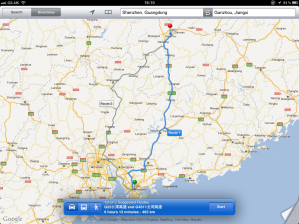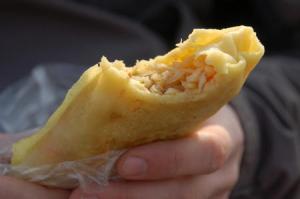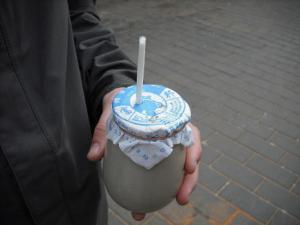I have a reasonable journey today that takes me initially north on my way to Shanghai to the north east. I’m a little nervous heading into China, as my current understanding is from my western/British point of view. Communist rule, Military actions, human rights issues, the third power-state. Not exactly bright and cheerful stuff. But I hope to get a more rounded view of the nation and it’s people, and this is my first day doing that.
The Beijing–Hong Kong–Macau Expressway, commonly referred to as the Jinggang’ao Expressway is an expressway that connects the cities of Beijing and Shenzhen at its border with the Hong Kong Special Administrative Region of the People’s Republic of China. The expressway was completed in October 2004 and it was China’s first north-south expressway route. I filled up the tank as I left the city, but will need to fill up again before arriving.
Guangdong province is one of the wealthiest provinces in mainland China, contributing 12% of the nations GDP, and has some of the largest manufacturing corporations in the country. Guangdong also hosts the largest Import and Export Fair in China called the Canton Fair in Guangdong’s capital city Guangzhou. My destination today is Ganzhou. Guangdong was far away from the centre of ancient Chinese civilization in the north China plain. It was populated by peoples collectively known as the Baiyue, who may have spoken Tai–Kadai languages and been related to the Zhuang people in modern Guangxi. The Qin Dynasty represented the first unified China between 221 and 207 BC. Like many early civilisations around the world, the Qin Dynasty introduced currency, weights and measures, civil administration and organised trade routes. They brought order to an otherwise tribal nation, and set China on the road to bigger things.
In Dingnan, I come off the highway to find something to eat. It’s important to sample local food, as many provinces have different recipes and dishes to test. One of the things to enjoy here is the different street food. Almost everywhere you go will have people on bikes or carts selling a variety of snacks and cheap food. Not speaking the language will mean that nine out of ten sellers will try to over charge you. If you think you are buying a meal for only 30 or 40 pence (about 60 cents US), the money they make is small to western standards. You have to realise that there are some very poor people here, especially in the provinces. They are not insulting you, this is just the way it is. Would you really argue over 50 pence a meal, instead of 20 pence. Probably not. So here is a word of advice. Carry a bundle of 1 Yuan notes (approximately 10 pence). You would be amazed how easy this makes buying things, especially from street stalls. On busy stalls, stand back and watch. See what other people buy and, often as not, you can ask for something you have seen. The food is fantastic.
Back on the highway I find that China houses more toll roads than any other country, with Chinese toll roads representing more than 70% of the world’s total toll roads. Nearly all expressways charge tolls. Toll fees are approximately CNY 0.5 per kilometre, and minimum rates (e.g. CNY 5) often apply regardless of distance. However, some are more expensive (the Jinji Expressway costs around CNY 0.66 per kilometre) and some are less expensive (the Jingshi Expressway in Beijing costs around CNY 0.33 per kilometre). It’s worth noting that cheaper expressways do not mean poorer roads or a greater risk of traffic congestion.
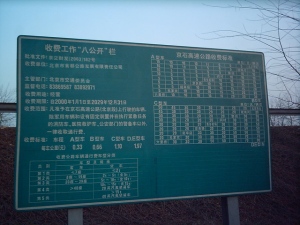 |
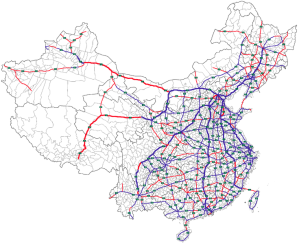 |
In recent years, the toll system has started to use ETC systems. The driver is given a card that they take with them, handing it in when they go through the next toll. This determines the distance and cost and is now widespread. Having money with you is important, and most tolls have money lanes too.
After a largely uneventful drive, I pull in on the outskirts of Ganzhou and have a drink. Pollution is a common city problem in China and recent measures, since the Beijing Olympics, has improved the issue, but not controlled it.
I ‘book’ a hotel room in the Golden Dragon Hotel in Guilin for about 40 US$ for the night, which is just short of Ganzhou city. I leave the camper in the parking bay and retire to my room for a good rest.

